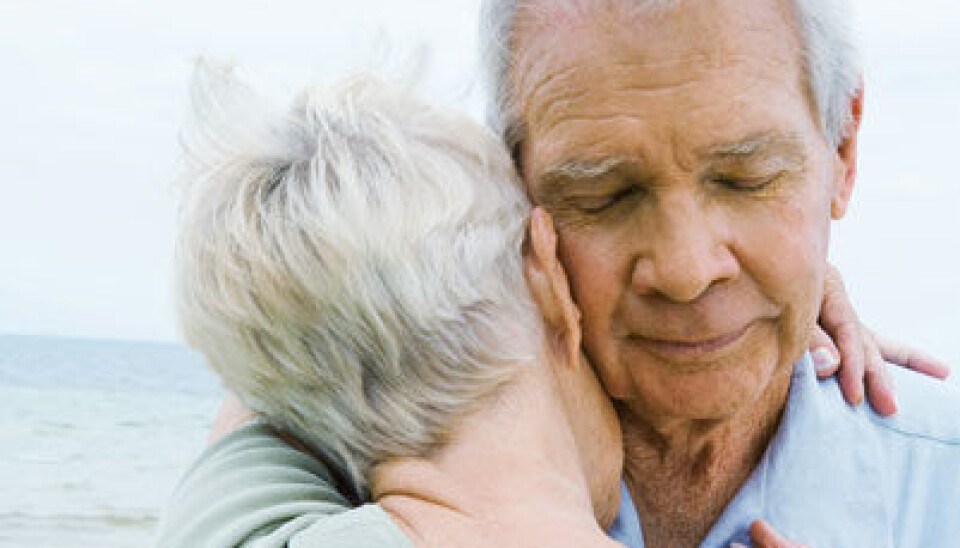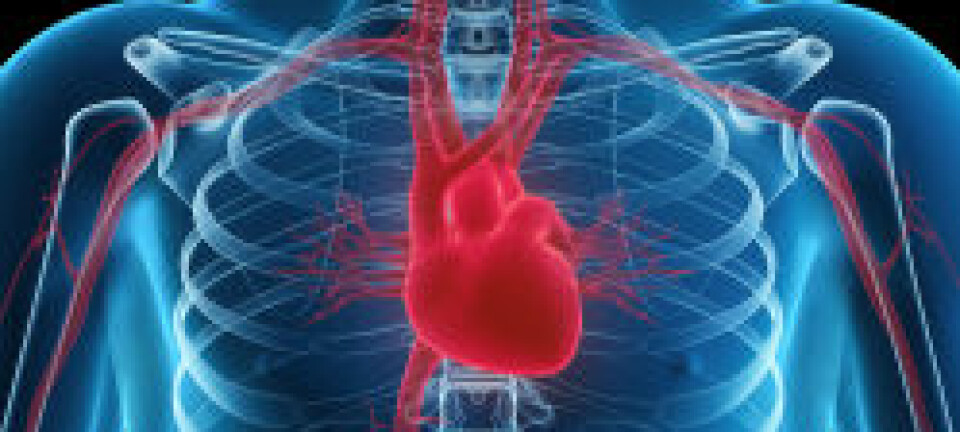
Heart attacks strike the spouse too
The surviving spouse is worse afflicted when the husband or wife died from a heart attack, than if they died of other causes. The spouse suffers also when their partner survives the infarct.
Denne artikkelen er over ti år gammel og kan inneholde utdatert informasjon.
This is indicated by a large study of about 200,000 Danes. Researchers have compared the mental health of widows and widowers after their spouse died of a coronary thrombosis with those whose husbands or wives died of other causes.
Researchers gauged reactions by tallying the use of antidepressants and anti-anxiety medications the year after a sudden death from a coronary.
They also looked at whether the survivor had been in contact with public health services or doctors in connection with a depression and checked out suicide statistics for these spouses.
Their results show that when an acute heart attack was the cause of death, the use of anti-depressants among such spouses tripled against their average use prior to the death. Suicide rates were higher among such surviving spouses than among those who had lost their partner due to other diseases.

The use of anxiety medications increased even more than the use of anti-depressants. When deaths were attributed to other causes, increases in the use of medications by surviving spouses decreased – by about 50 percent.
A Danish physician involved in the study thinks the findings show we should take better care of persons whose spouse has died of a coronary thrombosis.
Trauma, guilt and shock
Kjersti Arefjord, an associate professor of the University of Bergen’s Department of Psychology, thinks the reactions of surviving spouses are linked to the acute and traumatic aspects of a heart attack.
She says surviving spouses can brood after a heart attack and be plagued by guilt. They ponder whether they could have done anything to prevent the death.
The mourning process doesn’t get the preliminary and gradual start it does when death comes more slowly, as with cancer.
“The trauma can also trigger reactions such as recurrent and shocking memories and images of the infarct, making the situation all the more difficult.”
“These things can all contribute to depression and anxiety following a heart attack,” says Arefjord.
Not only when the spouse dies
The new study showed that spouses can also be seriously affected when their partner’s heart attack isn’t fatal.
These husbands and wives also used more mood-altering drugs than for instance spouses of cancer victims even when their partner survived a heart attack.
Another mechanism is at work in such cases, according to Arefjord, who did her doctoral thesis on the reactions of women after their husband had an acute heart attack and survived.
“Death by heart attack is something that occurs very suddenly. Even though the risks are known, it isn’t something people are really prepared for.”
She thinks the reaction might be intensified because it’s the heart, the organ we associate most with life, that has been affected.
“An acute heart attack is life-threatening and it strikes a central organ that has a symbolic and a very real impact for our living bodies. And if you have one infarct, the chances are high that you’ll have another,” says Arefjord.
"Even though we know that cancer can return, I think the sudden and dramatic aspects of the heart being affected causes more anxiety afterwards in spouses."
Given these considerations, the spouse will be under stress and anxiety, worried about another attack, even if their loved one survived the initial one, she thinks. This would explain the use of medications to alleviate anxiety.
Life changes
Survivors of heart attacks are often encumbered by various disabilities, which can also contribute to a spouse’s development of depression.
The wife or husband can often feel that he or she has partly lost the person who was their spouse.
“Some patients remain relatively unchanged after a coronary thrombosis, others can no longer remain in their jobs; they become less socially active and cannot continue doing what they used to do.
“If they’ve planned for an active life together after retirement they may suddenly find life won’t be what they expected because of the spouse’s reduced health.”
Had to supress their feelings
In her dissertation work, Arefjord interviewed women shortly after their partner’s had heart attacks, and then three months later. Some of them had problems with anxiety, others with depression.
“They began to see what changes the infarct would be causing,” she says.
Could the women get depressed because they felt they couldn’t air their own trepidations?
“Certainly, and this was very important. They felt they had to hold back their own problems because they didn’t want to add to their husband’s burdens.
“They also feared they could trigger new heart attacks if they did, so this impaired the openness in their relationship.”
Although Arefjord investigated women’s reactions, the findings of the Danish study indicate that men had even more problems than women after their spouse had a heart attack.
“What we know about such gender differences is that women often manage better alone than men do because they have a better social network.”
Helping the mate
“The health system should make efforts to help the spouse too since we see this represents a large public health concern,” says Danish cardiologist Erik Fosbøl in a press release to the European Society of Cardiology.
He was one of the researchers behind the study.
Globally, around seven million people suffer acute heart attacks annually, which means a lot of spouses are potentially suffering the consequences and using medications to help.
“I think the treatment of an acute problem like a heart attack should include a screening of the spouse to chart the psychological impact. A plan should be available regarding what to do if the spouse is troubled,” says Fosbøl.
-----------------------------------
Read the Norwegian version of this article at forskning.no
Translated by: Glenn Ostling

































